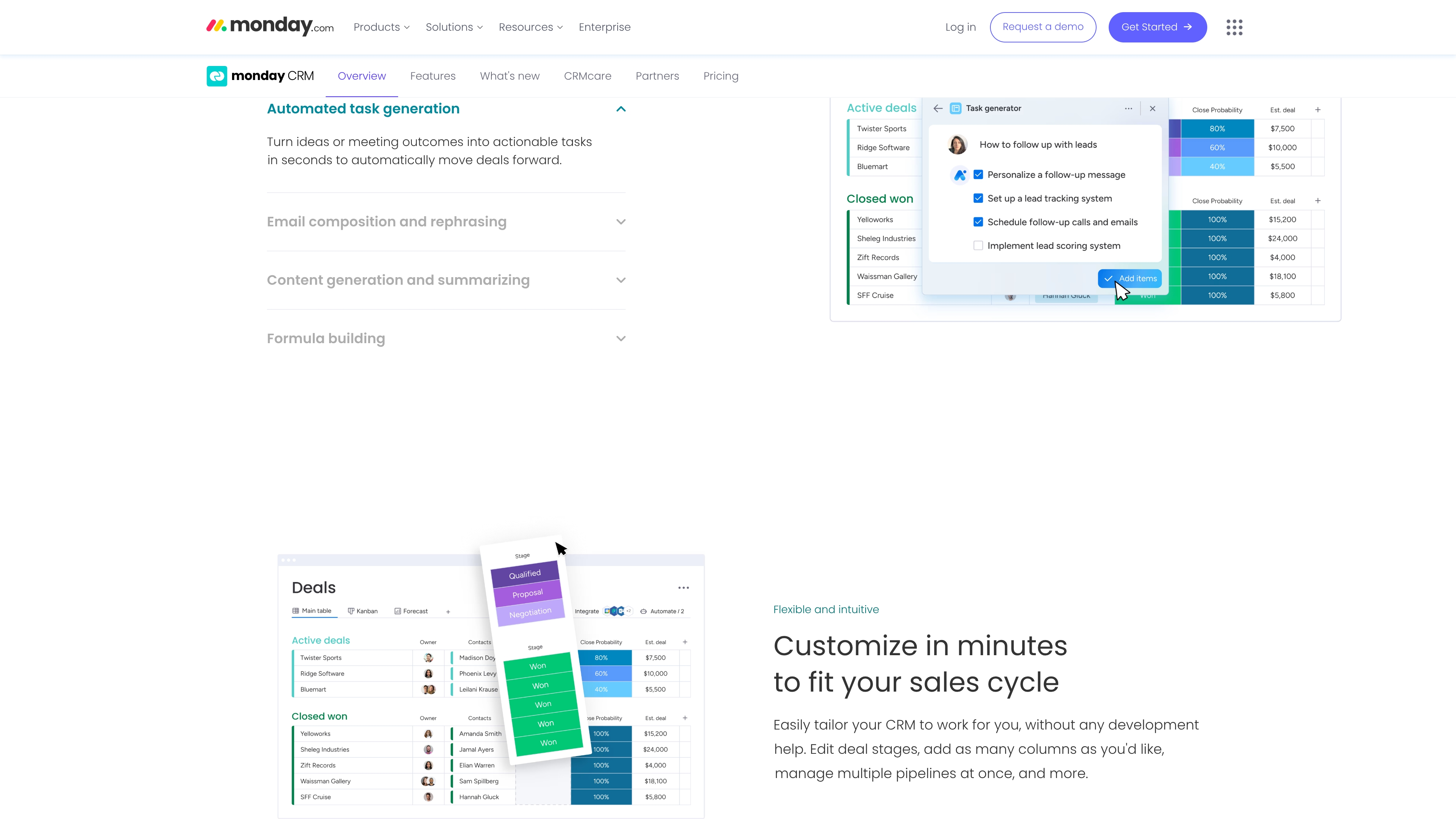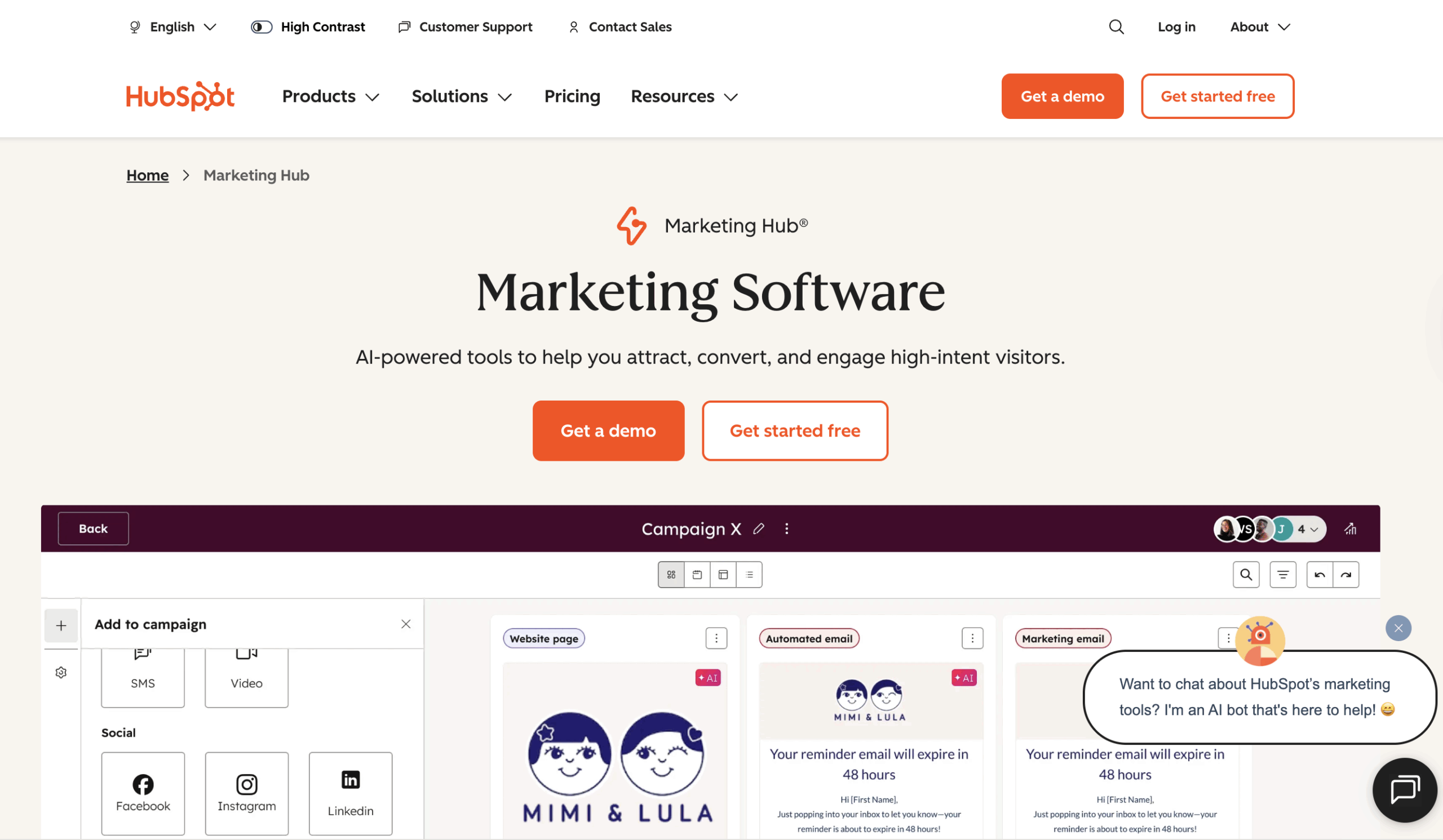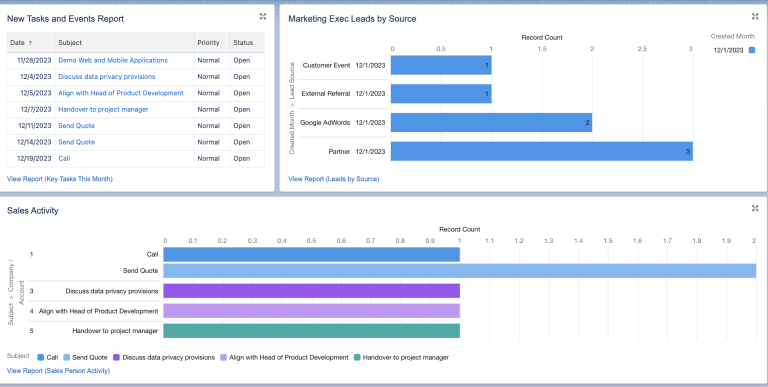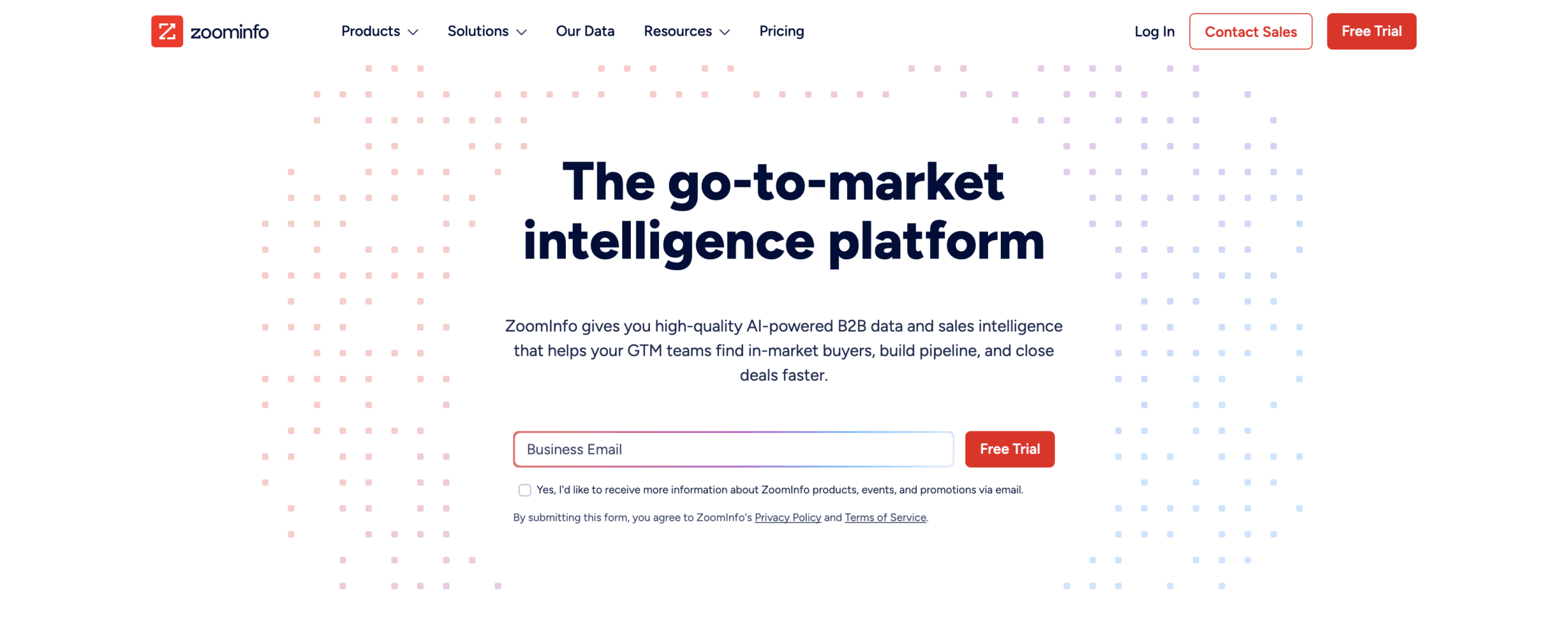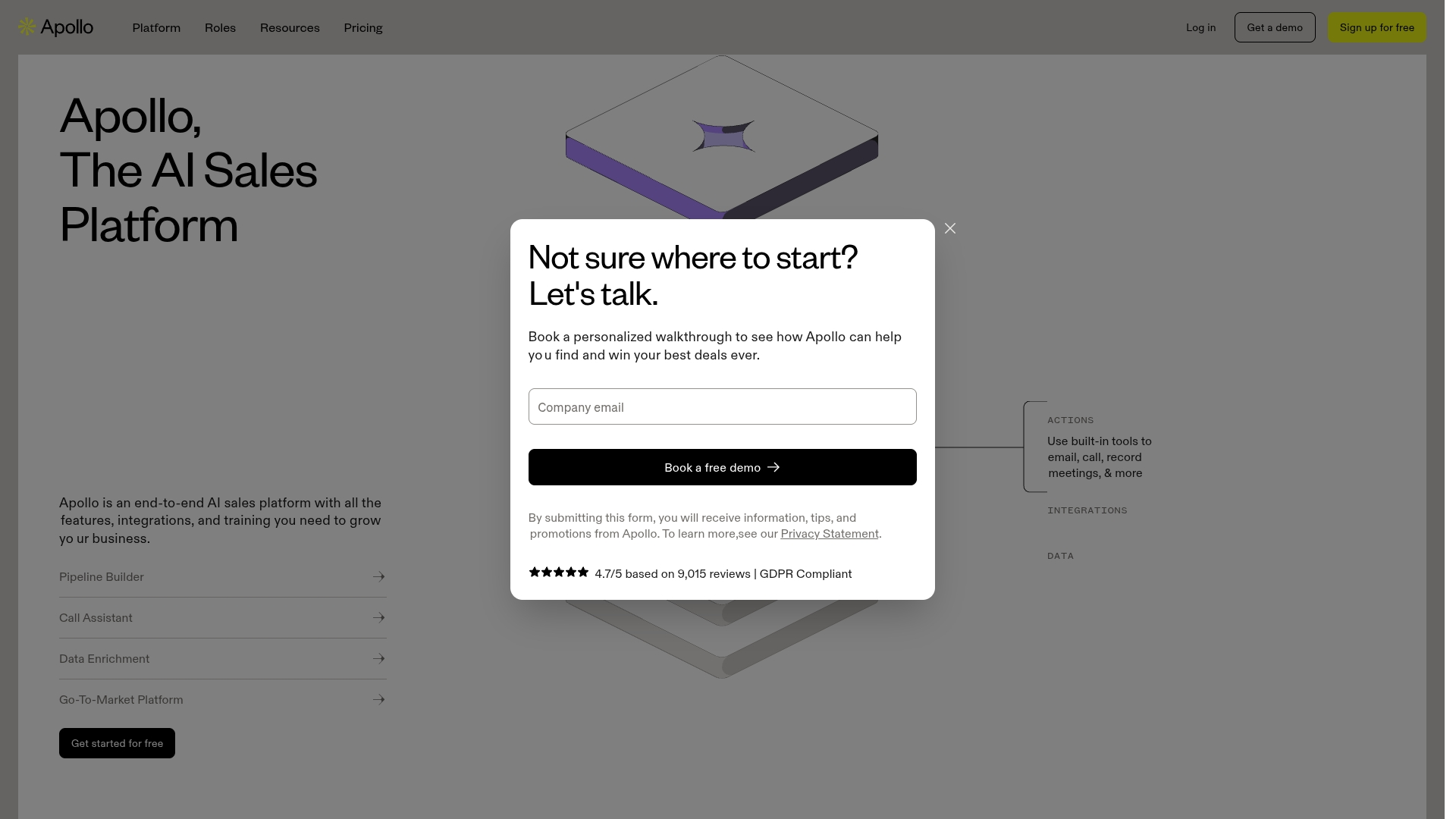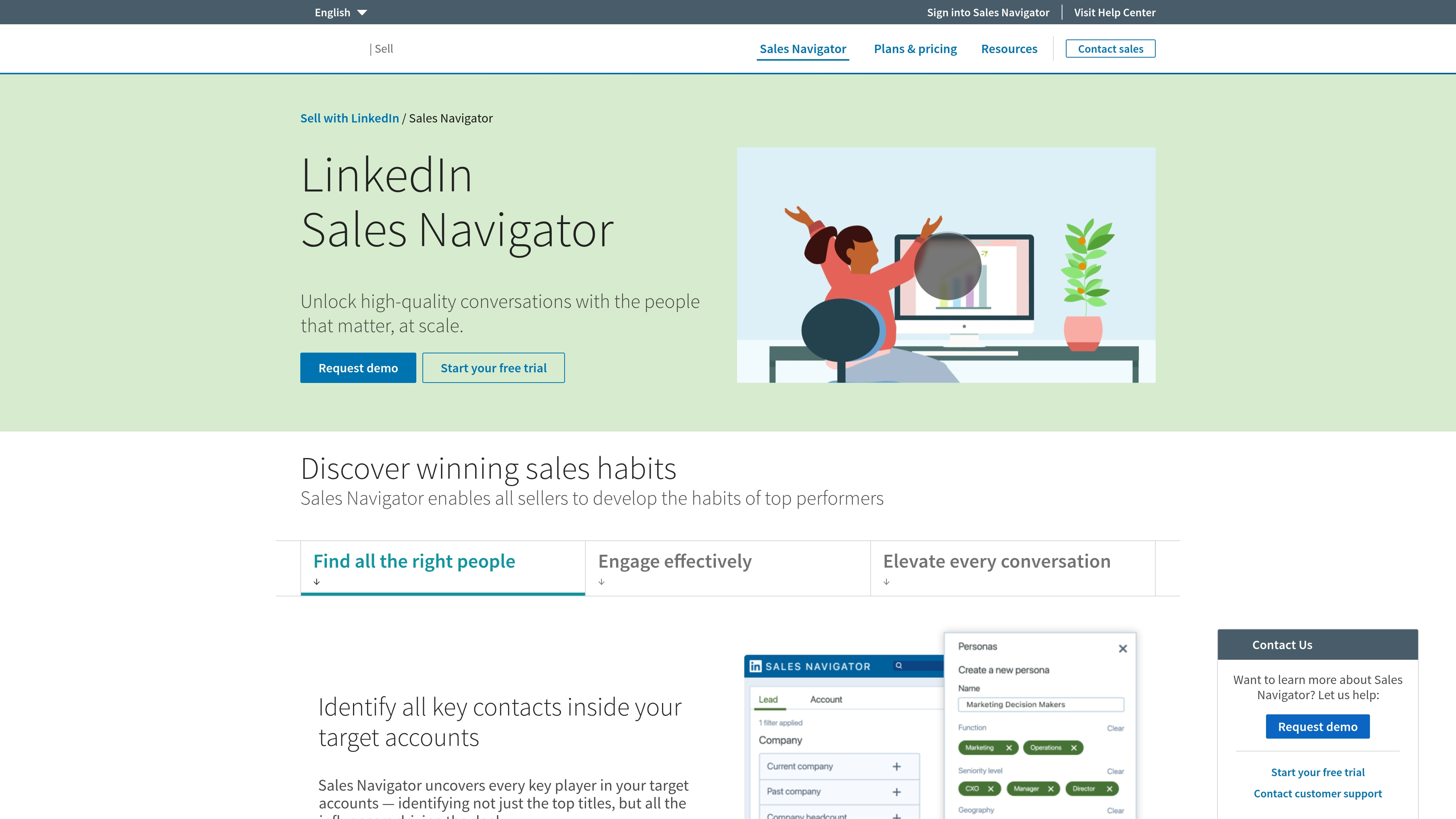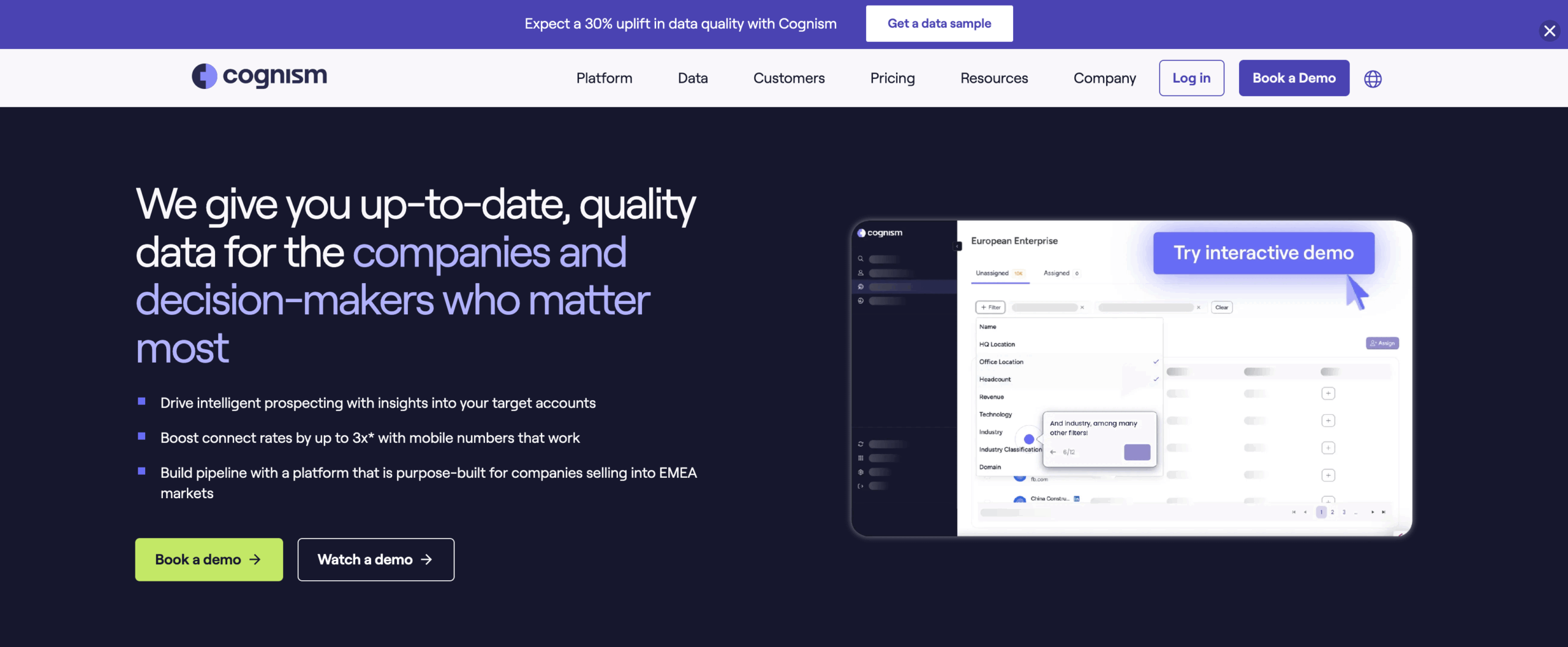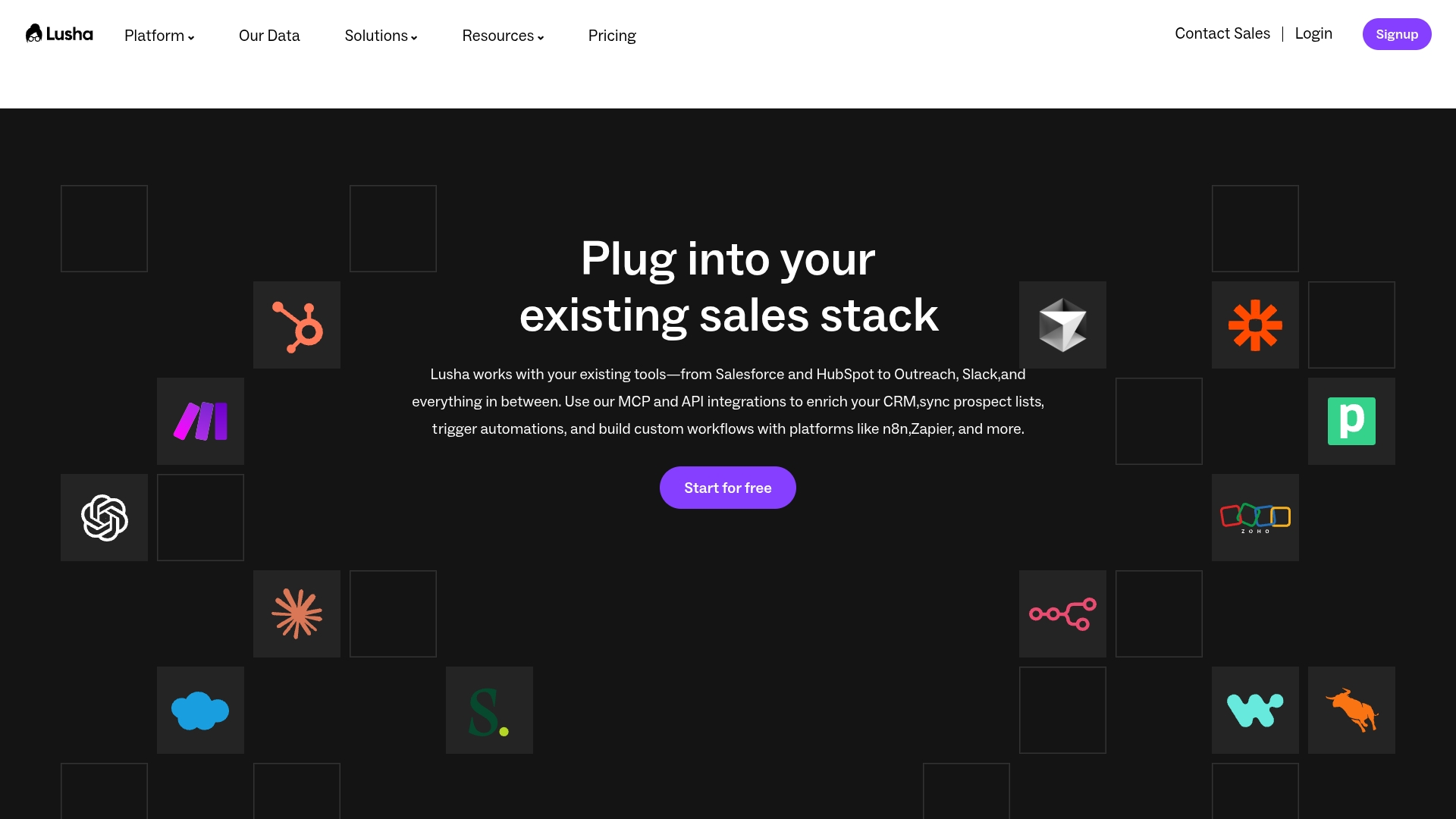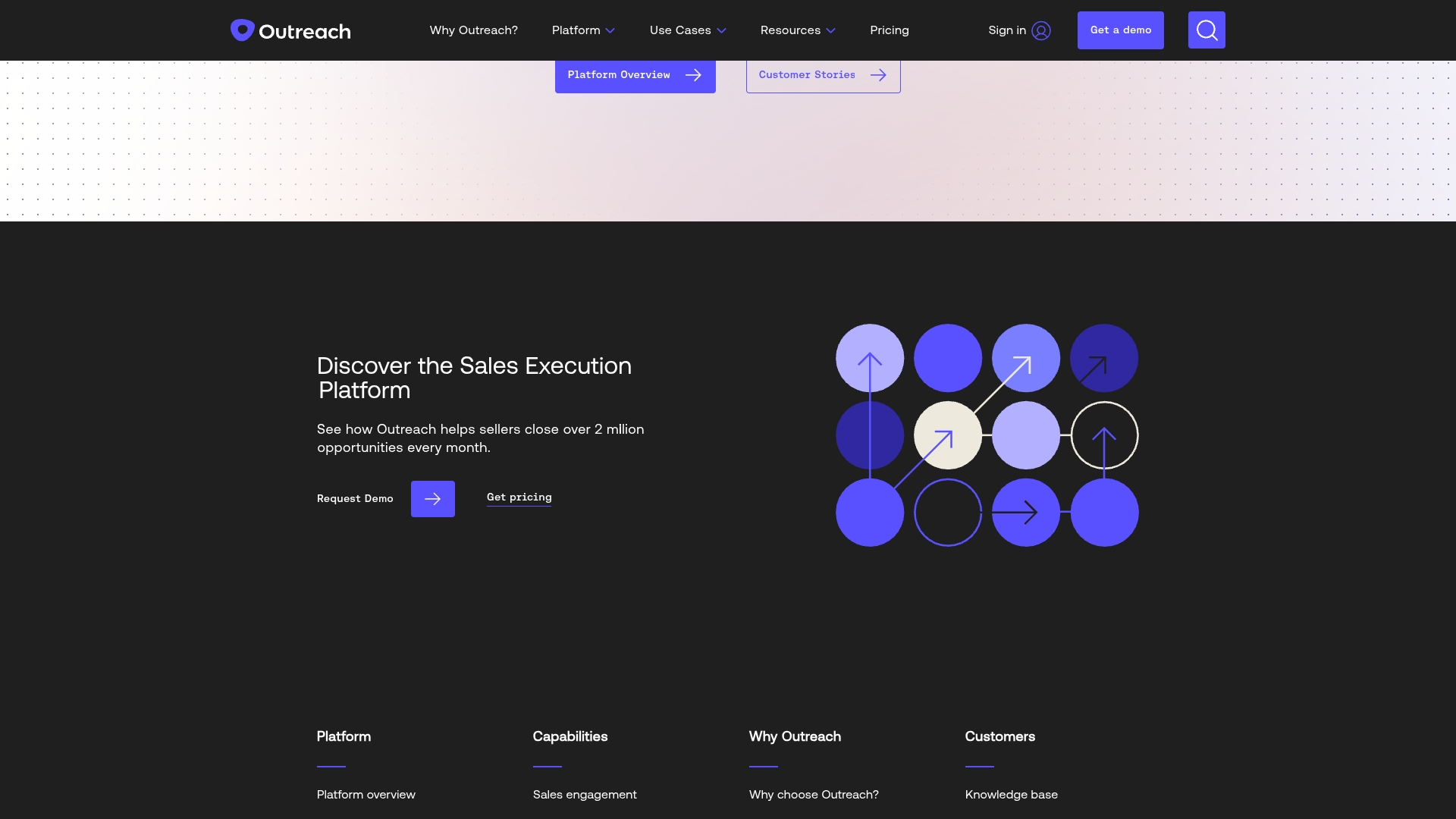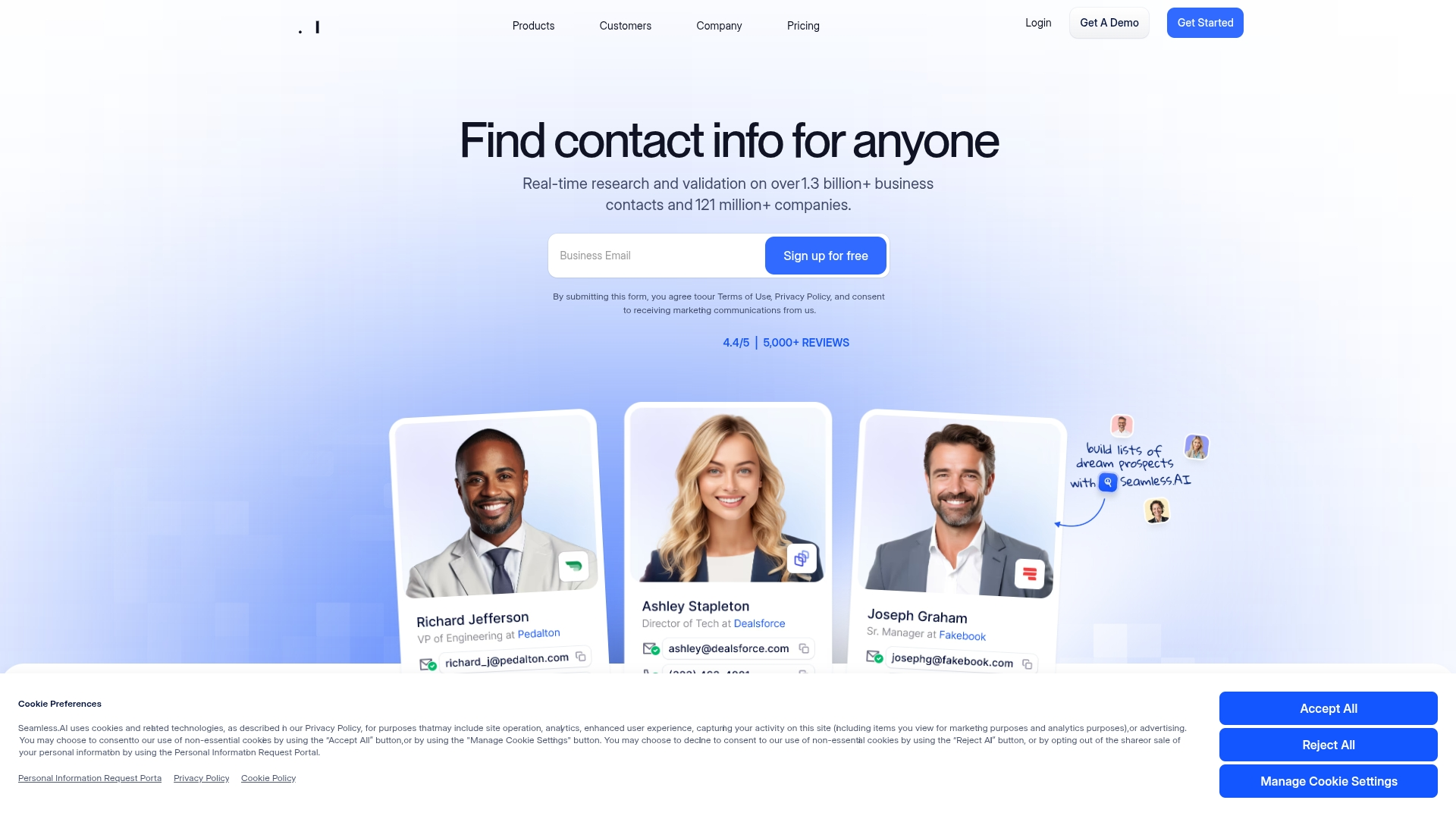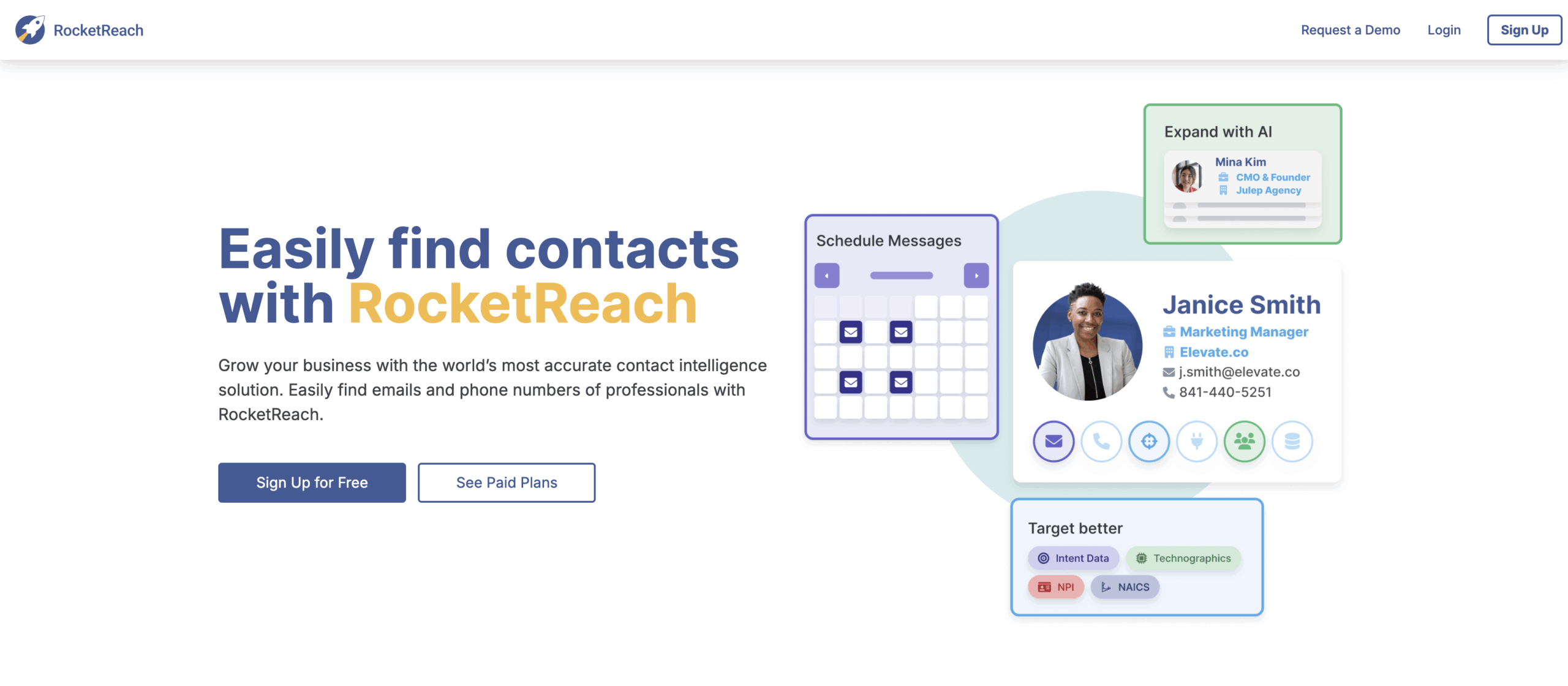Nothing stalls momentum faster than a pipeline full of unqualified leads. On the surface, it might look like progress, but in reality it wastes time, drains energy, and leaves teams chasing opportunities that were never a fit to begin with. The real challenge isn’t generating more prospects, it’s finding the right ones at the right time without exhausting your reps on endless manual research.
Sales prospecting software helps solve this problem by automating the repetitive work of sourcing, qualifying, and organizing prospects. These tools give your team back the hours they need to focus on what truly moves the needle: building relationships and closing deals.
In this guide, we’ll explore the best prospecting platforms for 2025, highlight the features that actually make a difference, and share practical steps for bringing new tools into your sales process smoothly.
Key takeaways
- Quality over quantity: filling the pipeline with the right opportunities, not just more prospects, is the key to avoiding wasted time on unqualified leads.
- Time back for selling: automation takes care of research, lead scoring, and follow-ups so reps can spend more energy building relationships and closing deals.
- Full visibility: a centralized platform keeps every lead, contact, and interaction organized, ensuring nothing slips through the cracks.
- Better decisions: AI and analytics highlight high-potential prospects, helping teams focus their outreach where it matters most.
- Seamless prospecting with monday CRM: from lead capture to pipeline management, monday CRM combines automation and customization to streamline the entire sales journey.
What is sales prospecting software?
Sales prospecting software functions as a strategic playbook, equipping your team to identify future customers and initiate meaningful conversations. Its core purpose is to liberate representatives from the tediousness of manual research, allowing them to concentrate on converting potential interest into tangible revenue. This approach builds a pipeline that is not just full, but strategically populated with the right opportunities.
The most effective software automates the heavy lifting involved in the sales process, from pinpointing prospects who match your ideal customer profile to launching personalized outreach campaigns. This systematic elimination of guesswork and administrative busywork frees up your team’s most valuable resource — their time — to cultivate genuine relationships and guide deals to a successful close.
A platform like monday CRM provides the entire team with a comprehensive, bird’s-eye view of the sales journey, from the initial touchpoint to the final agreement. With consolidated visibility and automated workflows, every team member understands their next move, resulting in a faster, more cohesive unit that approaches every interaction with confidence.
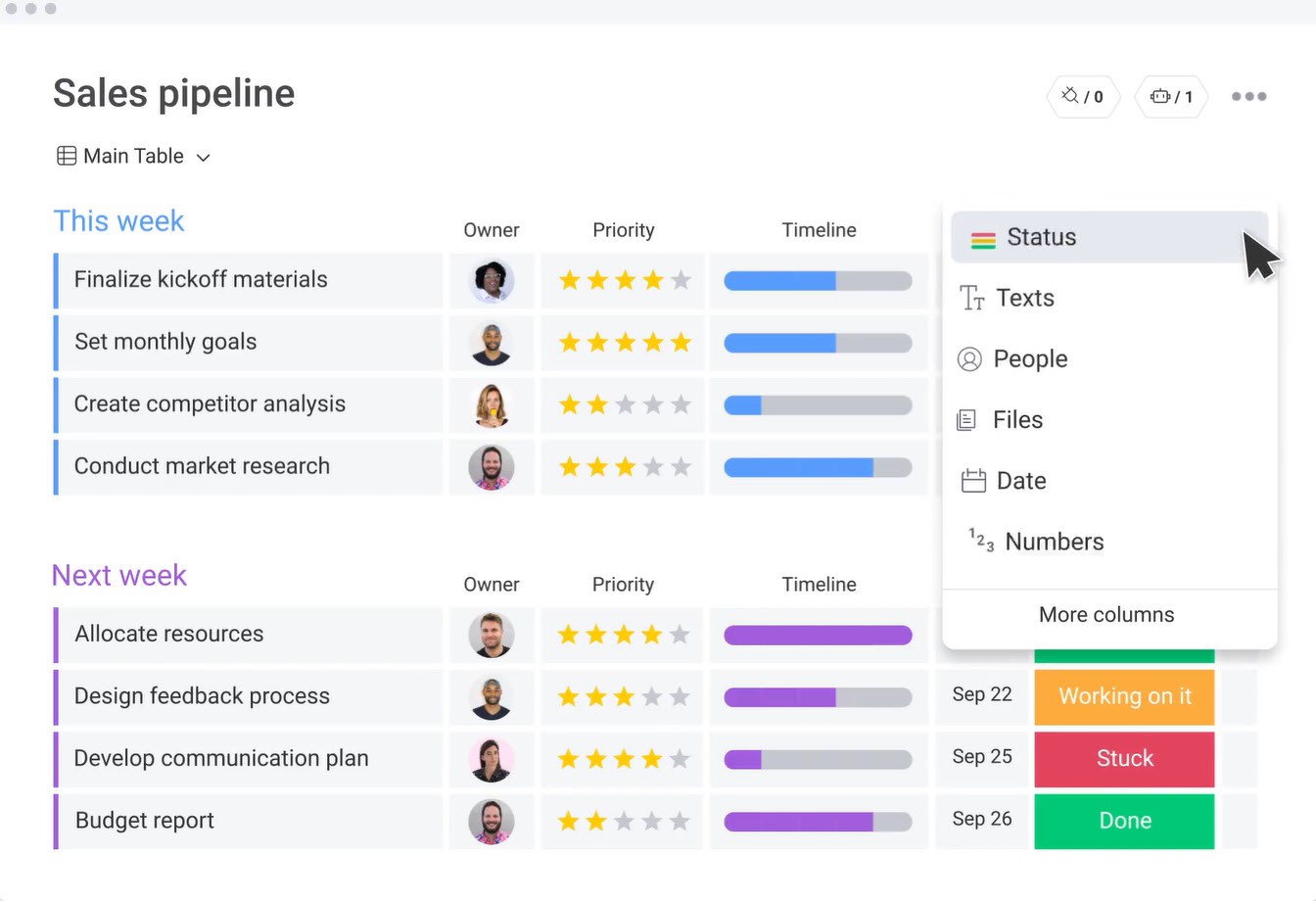
Why businesses rely on sales prospecting platforms
In today’s competitive market, speed and focus make the difference between winning and falling behind. When sales reps are stuck in manual research and endless data entry, momentum stalls and opportunities slip to competitors. A dedicated prospecting platform provides the clarity and efficiency needed to keep the team agile, aligned, and in command of the pipeline.
Here’s how the right platform transforms performance:
- From guesswork to confidence: pipeline uncertainty is replaced with a predictable revenue engine, giving leaders the clarity to plan ahead and reps the focus to prioritize high-value opportunities.
- Time redirected to selling: by eliminating tedious research and data entry, prospecting software frees up hours that can be invested in building relationships and closing deals.
- Smarter outreach: with the right information delivered at the right moment, every interaction becomes more strategic and impactful.
- Team-wide alignment: a single system keeps everyone working from the same data, ensuring consistency across the entire sales cycle.
- monday CRM advantage: with robust automations and intelligent features to surface the most promising leads, platforms like monday CRM turns prospecting into a streamlined, collaborative effort that fuels pipeline growth.
Top 12 sales prospecting platforms for businesses
A strong pipeline depends on quality, not just quantity. Filling it with the right prospects ensures your team spends less time on dead ends and more time moving deals forward. Sales prospecting platforms make this possible by helping you find ideal contacts, qualify them efficiently, and manage leads with confidence from the very beginning.
The most effective sales prospecting tools do more than provide contact details too: they bring prospecting, engagement, and pipeline management together in a single system, enabling your team to work faster, stay aligned, and approach opportunities with greater clarity.
Here are 12 of the top prospecting platforms to consider for 2025, each designed to give your team an edge in building stronger pipelines and closing more deals.
1. monday CRM
By transforming sales prospecting from a scattered, time-consuming process into a streamlined, data-driven powerhouse, monday CRM excels. The platform’s specialization in no-code customization and AI-powered automation makes it ideal for sales teams who want to focus on building relationships instead of wrestling with complex systems.
Use case: monday CRM consolidates all prospect-related data and activities into a single, visual workspace that enables sales teams to track leads, manage communications, and monitor deal progress without missing opportunities.
Key features:
- Customizable lead capture forms and automated lead scoring with visual indicators.
- AI-powered email generation and call summaries that reduce manual tasks (available on higher-tier plans).
- 200+ app integrations including Slack and Gmail, with LinkedIn available via third-party connectors.
Pricing:
- Free: $0 (up to 2 seats, 3 boards, basic features).
- Basic: $9/month per seat (billed annually, unlimited items, 5GB storage).
- Standard: $12/month per seat (billed annually, 250 automation & 250 integration actions/month, calendar view).
- Pro: $19/month per seat (billed annually, 25K automation & 25K integration actions/month, advanced features).
- Enterprise: Contact sales (250K automation & 250K integration actions/month, enterprise security, advanced analytics, priority support).
- Savings: all paid plans require a minimum of 3 users but offer 18% savings with annual billing.
Why it stands out:
- Visual, intuitive interface that solves the common CRM adoption problem plaguing sales teams.
- No-code automation capabilities that let sales reps build custom workflows without technical expertise.
- Unified Work OS approach that connects sales prospecting with project management and post-sales activities.
Advanced AI features
monday CRM’s AI capabilities transform how sales teams approach prospecting by automating time-consuming tasks. The platform uses AI to automatically score leads based on custom criteria, helping reps prioritize their efforts. AI-powered email generation creates personalized outreach messages, while call and meeting summaries capture key insights without manual note-taking. These advanced AI features are included in higher-tier plans to provide maximum value for scaling teams.
Automations
A no-code automation engine helps eliminate the repetitive tasks that slow down prospecting. Teams can:
- Assign leads automatically: distribute new opportunities by territory or custom rules.
- Set up timely follow-ups: trigger reminders to ensure no conversation goes cold.
- Streamline pipeline progression: move deals through stages automatically when predefined conditions are met.
Enterprise plans support up to 250,000 automation actions per month, giving even the most complex sales operations the ability to run smoothly and efficiently on autopilot.
Integrations
monday CRM connects with over 200 popular business applications, creating a unified prospecting ecosystem. Integrations with Gmail and Outlook centralize all prospect communications within the CRM, ensuring your team has a single source of truth. You can connect to LinkedIn through third-party apps like Zapier to support social selling workflows and keep data in sync.
Sales prospecting software features
The platform addresses core prospecting challenges through customizable dashboards that provide instant pipeline visibility and 27+ work views for flexible data management. Lead scoring appears directly on boards with visual indicators, making it easy to identify high-potential prospects at a glance. Automated follow-up sequences and AI-powered content generation (availability depends on the plan) ensure consistent prospect engagement, while centralized data and analytics support data-driven decisions that improve conversion rates.
2. HubSpot Sales Hub
HubSpot Sales Hub unifies prospecting, CRM, and automation into a single, cohesive workspace. Its focus on AI-powered prospecting and seamless integration across marketing, sales, and service teams makes it an excellent fit for growing businesses looking to scale sales operations without juggling multiple tools.
Use case: HubSpot Sales Hub centralizes prospecting activities with AI-powered research and outreach automation, helping sales teams focus on closing deals rather than manual administrative tasks.
Key features:
- AI prospecting agent that automates research and personalized outreach using CRM data and real-time buying signals.
- Unified sales workspace with daily AI-recommended actions and automated task prioritization.
- Comprehensive lead management software features with automated pipeline progression and predictive lead scoring.
Pricing:
- Free: free plan with basic CRM and sales tools.
- Tiers: multiple tiers available including Starter, Professional, Enterprise.
- For the most current pricing details we recommend visiting the official HubSpot pricing page.
Considerations:
- Advanced prospecting features are locked behind higher-tier Professional and Enterprise plans, which can become expensive as teams scale.
- The platform’s extensive feature set can feel overwhelming for smaller teams that only need basic prospecting capabilities.
3. Salesforce Sales Cloud
For large organizations requiring deep customization, Salesforce Sales Cloud offers enterprise-grade CRM capabilities fused with advanced, AI-powered prospecting tools. The platform is engineered to unify all customer data within a single system, making it ideal for complex sales processes that demand robust automation.
Use case: Salesforce Sales Cloud empowers enterprise sales teams to streamline high-volume prospecting through AI-driven lead scoring, automated cadences, and unified customer data management.
Key features:
- Einstein Lead Scoring automatically prioritizes prospects based on conversion likelihood using historical data patterns.
- Sales Engagement (formerly High Velocity Sales) provides structured outreach sequences and intelligent work queues for inside sales teams.
- Prospecting Center offers a unified workspace for reps to find, qualify, and prioritize new leads.
- Agentforce SDR Agent is an autonomous AI agent for 24/7 inbound lead engagement and qualification (availability may be limited to higher-tier plans or as an add-on).
Pricing:
- Tiers: several available including Starter, Professional, Enterprise, Unlimited.
- Advanced features: Sales Engagement, Einstein AI, and Agentforce often require higher-tier plans or additional licensing fees.
Considerations:
- Best suited for teams with dedicated IT support to manage its extensive customization and feature set.
- Most powerful prospecting features are locked behind expensive Enterprise and Unlimited tiers, significantly increasing total cost of ownership.
4. ZoomInfo
Fuelling the sales prospecting engine, ZoomInfo provides comprehensive B2B contact and company intelligence. The platform’s combination of verified data and buyer intent signals makes it a powerful asset for outbound sales teams that need to identify and connect with decision-makers at scale. With over 260 million contacts and real-time intent data, ZoomInfo helps sales teams prioritize prospects who are actively researching solutions.
Use case: ZoomInfo provides sales teams with verified contact data and buyer intent signals to identify high-potential prospects and accelerate pipeline growth.
Key features:
- Access to over 70 million direct dial phone numbers and 174 million verified email addresses with 95%+ accuracy.
- Real-time buyer intent data that identifies companies actively researching relevant solutions.
- Advanced search filters including technographics, company size, revenue, and industry for precise targeting.
Pricing:
- Custom pricing: based on features, number of licenses, and expected credit usage.
- Credits required for exporting contact and company profiles.
- Additional credits can be purchased as needed.
Considerations:
- High cost can be prohibitive for smaller businesses and startups.
- Data accuracy concerns reported by some users, particularly for smaller companies and niche industries.
5. Apollo.io
Apollo.io presents an all-in-one sales intelligence platform, combining a massive B2B database with potent outreach automation tools. With a focus on multi-channel prospecting sequences and data enrichment, it is perfectly suited for sales teams aiming to streamline their entire prospecting workflow from lead discovery to conversion.
Use case: Apollo.io eliminates the need for multiple prospecting tools by providing verified contact data, automated sequences, and engagement tracking in one integrated platform.
Key features:
- Access to over 275 million verified B2B contacts with advanced filtering across 65+ data attributes.
- Multi-channel sequence automation combining email, LinkedIn, and phone outreach with AI-powered personalization.
- Built-in dialler with call recording and real-time lead scoring to prioritize high-value prospects.
Pricing:
- Free: $0 (1,200 credits per year, 2 sequences, basic filters).
- Basic: $49/month per user (30,000 credits per year, advanced filters, CRM integrations).
- Professional: $79/month per user (48,000 credits per year, unlimited sequences, US dialler, automated workflows).
- Organization: $119/month per user, minimum 3 users (72,000 credits per year, international dialler, advanced security, SSO).
Considerations:
- Credit-based system for accessing premium data like mobile numbers can lead to unpredictable costs if not carefully managed.
- Some users report occasional data accuracy issues and emails landing in spam folders during peak usage periods.
6. LinkedIn Sales Navigator
By leveraging the world’s largest professional network, LinkedIn Sales Navigator transforms B2B prospecting to help identify and connect with high-value leads. The platform is built for relationship-based selling through warm introductions and real-time professional insights, making it ideal for sales teams who prioritize building authentic connections over cold outreach.
Use case: LinkedIn Sales Navigator helps B2B sales professionals find, research, and engage with prospects through LinkedIn’s professional network, enabling relationship-driven prospecting at scale.
Key features:
- Advanced search filters with over 50 criteria to identify ideal prospects based on job title, company size, industry, and recent activity.
- TeamLink functionality that reveals warm introduction paths through your team’s collective network connections.
- Real-time alerts on prospect job changes, company news, and content engagement to identify optimal outreach timing.
Pricing:
- Contact LinkedIn for pricing details on Core, Advanced, and Advanced Plus plans.
Considerations:
- Limited direct contact information requires integration with other tools to obtain email addresses and phone numbers.
- High subscription costs may not justify ROI for teams with shorter sales cycles or those not heavily reliant on LinkedIn for prospecting.
7. Pipedrive
Pipedrive redefines sales prospecting through its visual pipeline approach and activity-based selling methodology. The platform’s strength lies in simplifying complex sales processes for small to medium-sized businesses, making it a top choice for teams that want powerful CRM functionality without a steep learning curve.
Use case: Pipedrive helps sales teams organize, track, and close deals through an intuitive visual pipeline that focuses on the activities that actually drive revenue.
Key features:
- Visual drag-and-drop sales pipeline with customizable stages and automated activity reminders.
- LeadBooster add-on with prospecting tools, chatbots, and web forms to capture and qualify leads.
- Pipedrive AI to help prioritize deals, enrich contact data, and automate follow-up sequences.
Pricing:
- Lite: $14/month per seat (billed annually).
- Growth: $39/month per seat (billed annually).
- Premium: $49/month per seat (billed annually).
- Ultimate: $79/month per seat (billed annually).
- LeadBooster add-on starts at $32.50/month per company.
- Free trial: 14-day free trial available for all plans.
Considerations:
- LeadBooster prospecting tools require an additional monthly fee on top of the base CRM subscription.
- Marketing automation capabilities are limited compared to all-in-one platforms like HubSpot.
8. Cognism
With a focus on GDPR-compliant B2B data, Cognism provides sales intelligence to help European-focused teams connect with decision-makers. The platform is known for its phone-verified contact data, called “Diamond Data®,” making it a strong contender for sales teams needing high-quality, compliant prospecting in regulated markets.
Use case: Cognism provides sales teams with accurate, compliant B2B contact data and intent signals to streamline prospecting and improve outreach effectiveness.
Key features:
- Diamond Data® with phone-verified mobile numbers that achieve 87% connection rates.
- AI-powered prospecting with intent data from Bombora to identify ready-to-buy accounts.
- Sales Companion dashboard with real-time insights and personalized account recommendations.
Pricing:
- Grow: Custom pricing (essential quality data for prospecting).
- Elevate: Custom pricing (includes all Grow features plus advanced intelligence and actionable signals).
- No platform fees, pricing based on licenses and add-ons only.
- Contact Cognism for personalized quotes.
Considerations:
- High price point can be prohibitive for smaller businesses and start-ups.
- Data accuracy may be limited outside of Europe and the US markets.
9. Lusha
Lusha offers instant access to verified B2B contact data, helping sales teams connect with decision-makers faster. Through its popular Chrome extension, the platform provides accurate email addresses and direct-dial phone numbers, making it ideal for sales reps who need quick prospecting wins without switching between multiple tools.
Use case: Lusha enables B2B sales teams to efficiently find, target, and connect with decision-makers using accurate, compliant contact data and advanced workflow tools within a user-friendly environment.
Key features:
- Chrome extension that reveals contact details instantly while browsing LinkedIn, Salesforce, and other websites.
- Access to over 285 million enriched contacts with verified email addresses and direct-dial phone numbers.
- Advanced prospect search with filters for buyer intent, job changes, company technologies, and funding data.
Pricing:
- Free: $0/month with 40 credits per month (1 seat included).
- Pro: $22.45/month with 3,000 credits per year (3 seats included, billed annually).
- Premium: $52.45/month with 7,200 credits per year (5 seats included, billed annually).
- Scale: Custom pricing with custom credits and seats.
- Email addresses cost 1 credit each; phone numbers cost 5 credits each.
Considerations:
- Some users report occasional data inaccuracies, particularly for contacts outside the US market.
- Free plan limitations may not be sufficient for teams with extensive prospecting needs.
10. Outreach
Outreach is a leading sales engagement platform designed to help teams build more qualified pipeline while maintaining a personal touch. By combining automation, multi-channel communication, and AI-powered insights, it streamlines prospecting efforts and ensures every interaction is timely and relevant. The result is a scalable process that supports reps in managing more conversations effectively and advancing deals with confidence.
Use case: Outreach enables sales teams to build high-quality pipeline through structured, data-driven engagement strategies that combine automation with personalization across the entire sales cycle.
Key features:
- Automated sequences across email, phone, LinkedIn, and SMS with built-in A/B testing capabilities.
- AI-powered Smart Email Assist and Kaia conversation intelligence for real-time coaching during calls.
- Comprehensive CRM integration with Salesforce and pipeline forecasting tools for end-to-end visibility.
Pricing:
- Custom pricing available upon request.
- Tiers/packages: Engage, Call, Meet, Deal, Forecast, and Amplify.
- Per-user licensing with no platform fees and support included.
- Call packages are usage-based for consumption pricing.
Considerations:
- Best suited for enterprise-level budgets due to its premium pricing structure.
- Steep learning curve due to extensive feature set and platform complexity.
11. Seamless.AI
Seamless.AI provides real-time contact discovery and AI-powered data verification to accelerate B2B prospecting. The platform’s unique approach is finding fresh, accurate contact information on demand instead of relying on a static database, making it a great choice for outbound sales teams who require current prospect data quickly.
Use case: Seamless.AI helps sales teams build targeted prospect lists quickly using AI-powered search and real-time data verification to reduce manual prospecting time.
Key features:
- Real-time contact discovery with AI-powered search across multiple data sources.
- Chrome extension for instant contact lookup directly from LinkedIn and company websites.
- Buyer intent data tracking across 12,000+ topics to identify ready-to-buy prospects.
Pricing:
- Free: $0/month with 50 credits and basic features.
- Pro: Custom pricing with daily credit refresh and premium add-ons.
- Enterprise: Custom pricing with unlimited users and dedicated support.
Considerations:
- Data accuracy can vary, with some users reporting 20–30% bounce rates on contact information.
- Credit-based system may limit usage for teams requiring high-volume prospecting.
12. RocketReach
With a massive database of over 700 million professional contacts, RocketReach powers prospecting efforts with real-time verification. The platform excels at finding both personal and professional email addresses plus direct-dial phone numbers, making it a go-to for sales teams needing comprehensive contact intelligence. Its adoption by 95% of the S&P 500 demonstrates its value for enterprise-level prospecting at scale.
Use case: RocketReach helps sales teams bypass gatekeepers and connect directly with decision-makers through verified contact data and advanced search capabilities.
Key features:
- Advanced search with 100+ filters including job title, industry, location, and company size.
- Real-time email verification achieving 85% accuracy rates with confidence levels.
- Chrome extension for instant contact lookups directly from LinkedIn and other websites.
Pricing:
- Essentials: $33/month (email only, 1,200 exports per year).
- Pro: $75/month (email + phone, 3,600 exports per year, includes integrations).
- Ultimate: $175/month (email + phone, 20,000 exports per year, includes intent data).
- Custom Team Plan: Starting at $6,000 annually for larger organizations.
- Free: free plan available with five free lookups and no credit card required.
- Additional lookups cost $0.30 to $0.45 per lookup if you exceed your plan limits.
Considerations:
- Data accuracy can be inconsistent, particularly with phone numbers and outdated job titles in some regions.
- Credit-based pricing system can become expensive for heavy users who exceed their allocated lookups.
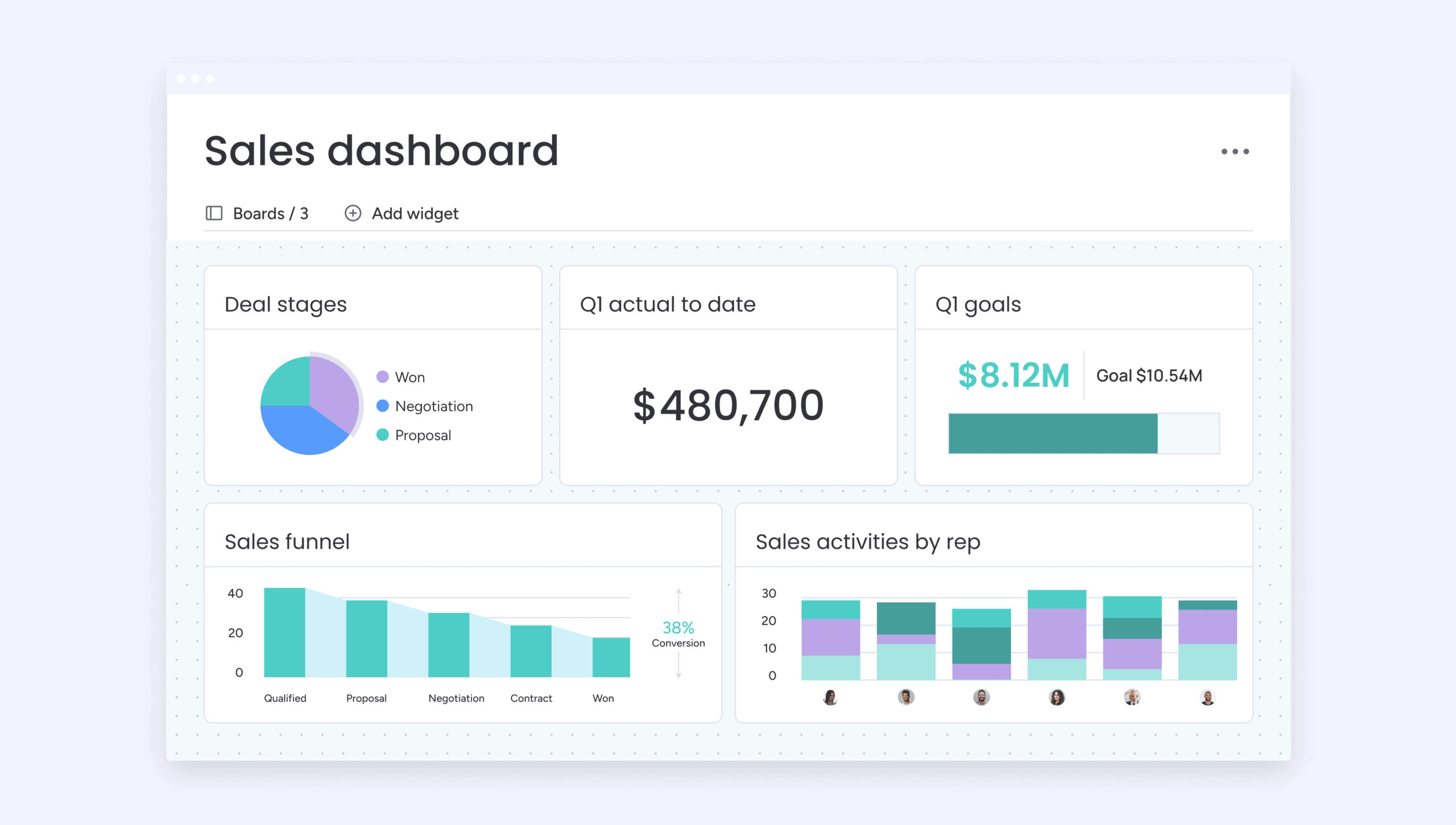
How to integrate software into your sales process
Rolling out new sales software can feel like a disruption at first, but when handled thoughtfully, it quickly becomes the engine that drives long-term efficiency. The difference lies in planning. Instead of overwhelming your team with another tool to learn, the goal is to create a smooth transition that makes their daily work easier, more connected, and ultimately more effective.
With the right approach, integration shifts from being a hurdle to a springboard — one that streamlines processes, builds team confidence, and keeps everyone focused on closing deals. Here’s how to make that happen:
Preparing your tech stack
The first step in adopting new sales software is taking stock of what you already have. A clear picture of your current systems ensures that any new platform strengthens your process instead of adding unnecessary complexity.
Key actions to take include:
- Audit existing tools: map out your current systems, from email and CRM to marketing automation, to understand how information flows today.
- Spot bottlenecks: identify where data gets lost, duplicated, or delayed so you know exactly what needs fixing.
- Look for seamless integration: choose a platform that connects easily with the tools your team already relies on.
- Prioritize efficiency: integrations should reduce app-switching, helping your team spend more time on building relationships and less on manual admin.
With monday CRM, those integrations come built in, allowing you to unify email, calendar, and marketing tools into one connected workflow that keeps everything moving smoothly.
Onboarding your sales team
The success of any new platform depends on adoption. That starts with showing reps how it makes their day easier and helps them close deals faster. Training should highlight high-impact workflows they can put into practice right away, building confidence without overwhelming them.
With monday CRM, onboarding feels straightforward thanks to its intuitive design and no-code setup. Reps can quickly manage leads, update pipelines, and automate tasks, giving them immediate value and helping adoption take hold across the team.
Measuring early results
Your first 90 days are focused on building confidence and demonstrating value. Closely monitor key performance indicators like lead response time and conversion rates, but also pay attention to your team’s qualitative feedback—the numbers reveal what is happening, while your reps can explain why.
Use these early insights to fine-tune your playbook and make rapid adjustments. The objective is not immediate perfection but continuous improvement that proves the new system is helping everyone become more aligned and close deals more efficiently.
With a platform like monday CRM, you can use clear dashboards to track progress, quickly identify successful strategies, and amplify them.
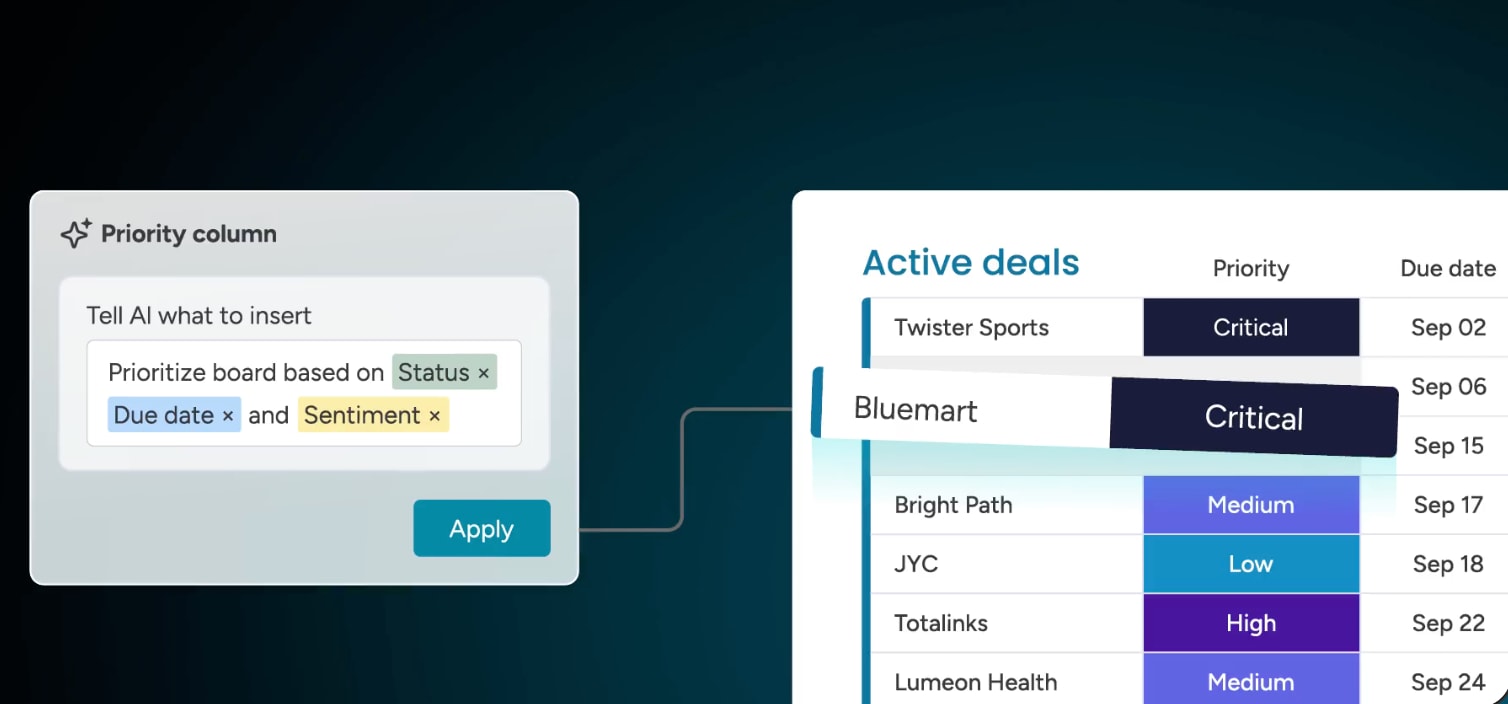
Building your next sales engine with monday CRM
The goal is not to search for a mythical perfect tool. It is to choose a platform that adapts to your sales process and supports the way your team already works. The right CRM should feel like an ally, removing busywork, improving visibility, and giving your reps more time to focus on connecting with customers.
By automating routine tasks and providing a single, unified view of your pipeline, you create the conditions for a faster, more predictable revenue engine. Every team member gains the clarity and confidence to move deals forward without losing momentum.
monday CRM provides that foundation. With flexible customization, robust automations, and an intuitive design, it helps your team spend less time managing tools and more time closing deals. Ready to see the difference? Try monday CRM today
The content in this article is provided for informational purposes only and, to the best of monday.com’s knowledge, the information provided in this article is accurate and up-to-date at the time of publication. That said, monday.com encourages readers to verify all information directly.
Frequently asked questions
How does AI improve sales prospecting software?
AI improves sales prospecting software by automating time-consuming tasks like lead scoring and data enrichment, which allows your sales team to focus their energy on building relationships with qualified prospects.
Can small businesses use free sales prospecting tools effectively?
Free tools are a great starting point for basic lead generation, but most growing businesses upgrade to paid solutions for better data quality, automation, and integration capabilities.
What makes B2B sales prospecting different from B2C prospecting?
B2B prospecting involves longer sales cycles and multiple decision-makers, emphasizing relationship-building to solve complex business problems rather than focusing on quick, individual conversions.
How long does it take to see results from new prospecting software?
Teams often see initial results within 30–90 days, with the timeline depending heavily on how quickly your team adopts the new system and integrates it into existing workflows.
Should sales prospecting software replace my existing CRM?
Prospecting software should complement your existing CRM, not replace it. It's designed to find and engage new leads, which are then managed within your CRM as the central hub for all customer relationships.
What data privacy considerations apply to prospecting software?
It is critical to ensure your software complies with data privacy regulations like GDPR and CCPA. Prioritize platforms that offer robust security, transparent policies, and clear consent management tools.


